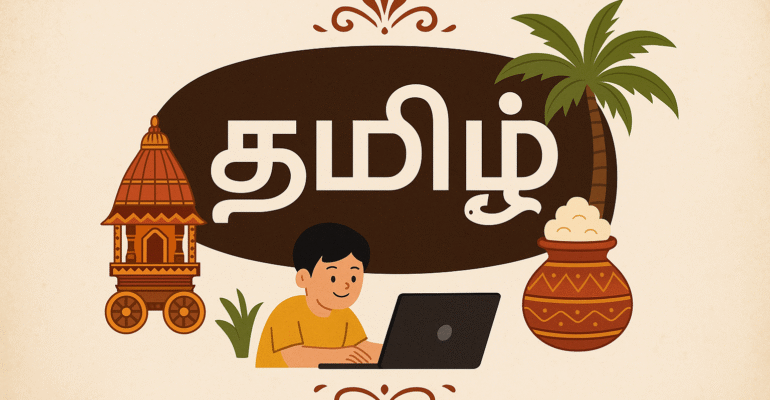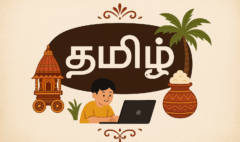Tamil for Kids: How to Talk About School and Friends
Tamil for Kids: How to Talk About School and Friends
Tamil for Kids: How to Talk About School and Friends
For a child, the two most important worlds in their life are often their home and their school. School is a place of learning, of play, and, most importantly, of friendship. The ability to talk about their day at school, to share a story about a friend, or to describe what they are learning is a fundamental part of a child’s social and emotional development. For a child who is learning the Tamil language, mastering the vocabulary for talking about school in Tamil is a crucial step that allows them to share this huge and important part of their life with their family in their mother tongue. It is the language of their daily experiences.
This guide is designed for parents to help their children build a strong foundation in this essential area of kids Tamil conversation. We will cover the core school vocabulary for kids and the simple, natural phrases for talking about Tamil for friendship. By practicing these words and sentences at home, you can create a fun and encouraging environment that will help your child to express themselves with confidence and clarity.
Part 1: The Essential School Vocabulary
Let’s start with the basic building blocks. These are the words your child will use every day.
People at School:
- School – பள்ளி (Paḷḷi)
- Teacher – ஆசிரியர் (Āsiriyar) – Kids might also use the English words “teacher” or “miss.”
- Student – மாணவர் (Māṇavar)
- Friend – நண்பன் (naṇpaṉ – for a male friend) / தோழி (tōḻi – for a female friend)
- Friends – நண்பர்கள் (naṇparkaḷ)
Places in School:
- Classroom – வகுப்பறை (Vakuppaṟai)
- Playground – விளையாட்டு மைதானம் (Viḷaiyāṭṭu maitāṉam)
- Library – நூலகம் (Nūlakam)
Things in the School Bag:
- Book – புத்தகம் (Puttakam)
- Pencil – பென்சில் (Peṉsil)
– Eraser – அழிப்பான் (Aḻippāṉ)
– Bag – பை (Pai)
– Lunch box – மதிய உணவு பெட்டி (matiya uṇavu peṭṭi)
Subjects and Activities:
- Lesson – பாடம் (Pāṭam)
- Game / Sport – விளையாட்டு (Viḷaiyāṭṭu)
- Story – கதை (Katai)
- Song – பாடல் (Pāṭal)
- Drawing – வரைதல் (Varaital)
Part 2: The Art of Conversation – Talking About the School Day
The daily conversation about “How was your day at school?” is a cherished ritual for many families. Here is how to have that conversation in Tamil.
The Parent’s Questions:
These are the simple, open-ended questions you can ask your child to get them talking.
- “How was school today?” – “இன்று பள்ளி எப்படி இருந்தது?” (Iṉṟu paḷḷi eppaṭi iruntatu?)
- “What did you do today?” – “இன்று என்ன செய்தாய்?” (Iṉṟu eṉṉa ceytāy?)
- “What did you learn today?” – “இன்று என்ன கற்றுக்கொண்டாய்?” (Iṉṟu eṉṉa kaṟṟukkoṇṭāy?)
- “What did you eat for lunch?” – “மதிய உணவிற்கு என்ன சாப்பிட்டாய்?” (Matiya uṇaviṟku eṉṉa cāppiṭṭāy?)
- “Did you play today?” – “இன்று விளையாடினாயா?” (Iṉṟu viḷaiyāṭiṉāyā?)
The Child’s Potential Answers:
Here are some simple sentence structures you can teach your child to help them answer your questions.
- “School was good today.” – “இன்று பள்ளி நன்றாக இருந்தது.” (Iṉṟu paḷḷi naṉṟāka iruntatu.)
- “Today, I learned…” – “இன்று நான் … கற்றுக்கொண்டேன்.” (Iṉṟu nāṉ … kaṟṟukkoṇṭēṉ.)
Example: “இன்று நான் தமிழ் பாடம் கற்றுக்கொண்டேன்.” (Iṉṟu nāṉ tamiḻ pāṭam kaṟṟukkoṇṭēṉ.) – “Today I learned a Tamil lesson.” - “Today, I played…” – “இன்று நான் … விளையாடினேன்.” (Iṉṟu nāṉ … viḷaiyāṭiṉēṉ.)
Example: “இன்று நான் கால்பந்து விளையாடினேன்.” (Iṉṟu nāṉ kālpantu viḷaiyāṭiṉēṉ.) – “Today I played football.” - “My teacher told a story.” – “என் ஆசிரியர் ஒரு கதை சொன்னார்.” (Eṉ āciriyar oru katai coṉṉār.)
- “We sang a song.” – “நாங்கள் ஒரு பாடல் பாடினோம்.” (Nāṅkaḷ oru pāṭal pāṭiṉōm.)
Part 3: The Language of Friendship
Friendships are a huge part of a child’s school experience. Giving them the language to talk about their friends is a wonderful gift.
The Key Vocabulary of Tamil for Friendship:
- Friend – நண்பன் (naṇpaṉ – male) / தோழி (tōḻi – female)
- Best friend – சிறந்த நண்பன்/தோழி (ciṟanta naṇpaṉ/tōḻi)
- To play with – உடன் விளையாடுவது (uṭaṉ viḷaiyāṭuvatu)
- To talk with – உடன் பேசுவது (uṭaṉ pēcuvatu)
- To share – பகிர்வது (pakirvatu)
- Kind – அன்பான (aṉpāṉa)
- Funny – வேடிக்கையான (vēṭikkaiyāṉa)
Talking About Friends in Conversation:
- “Who is your best friend?” – “உன் சிறந்த நண்பன்/தோழி யார்?” (Uṉ ciṟanta naṇpaṉ/tōḻi yār?)
- “My best friend’s name is…” – “என் சிறந்த நண்பனின்/தோழியின் பெயர்…” (Eṉ ciṟanta naṇpaṉiṉ/tōḻiyiṉ peyar…)
- “I played with my friend today.” – “நான் இன்று என் நண்பனுடன்/தோழியுடன் விளையாடினேன்.” (Nāṉ iṉṟu eṉ naṇpaṉuṭaṉ/tōḻiyuṭaṉ viḷaiyāṭiṉēṉ.)
- “My friend is very kind.” – “என் நண்பன் மிகவும் அன்பானவன்.” (Eṉ naṇpaṉ mikavum aṉpāṉavaṉ.)
- “We shared our lunch.” – “நாங்கள் எங்கள் மதிய உணவைப் பகிர்ந்து கொண்டோம்.” (Nāṅkaḷ eṅkaḷ matiya uṇavaip pakirntu koṇṭōm.)
Making it Fun: Role-Playing and Games
The best way to practice this vocabulary is through play.
- Play “School”: Set up a pretend classroom at home. You can be the teacher and your child can be the student. Go through the motions of a school day, using the Tamil phrases and vocabulary.
- Draw a Picture: Ask your child to draw a picture of their classroom or of them playing with their best friend. As they are drawing, ask them to describe the picture to you in Tamil. “இது யார்?” (Itu yār?) – “Who is this?” “நீங்கள் என்ன விளையாடுகிறீர்கள்?” (Nīṅkaḷ eṉṉa viḷaiyāṭukiṟīrkaḷ?) – “What are you playing?”
Conclusion: The Language of a Child’s World
The worlds of school and friendship are the central pillars of a child’s social life. Providing them with the language to talk about these worlds is crucial for their self-expression and for their connection with their family and their culture. This essential school vocabulary for kids is the key to unlocking these important conversations. By making the process of talking about school in Tamil a regular, fun, and engaging part of your daily routine, you are giving your child the powerful gift of being able to share their world with you, in the beautiful language of their heritage.











